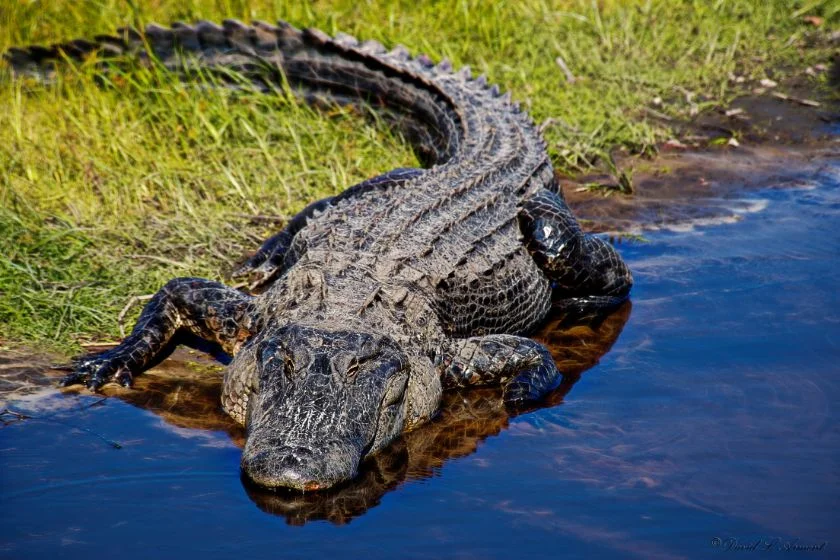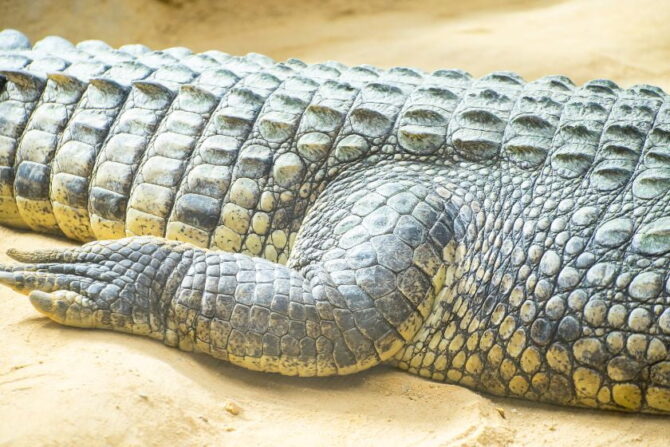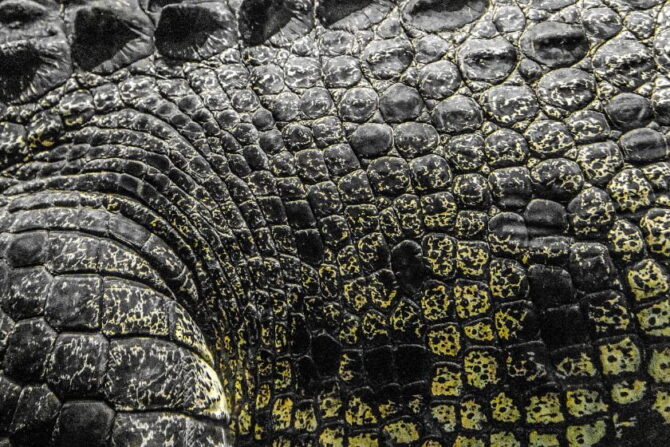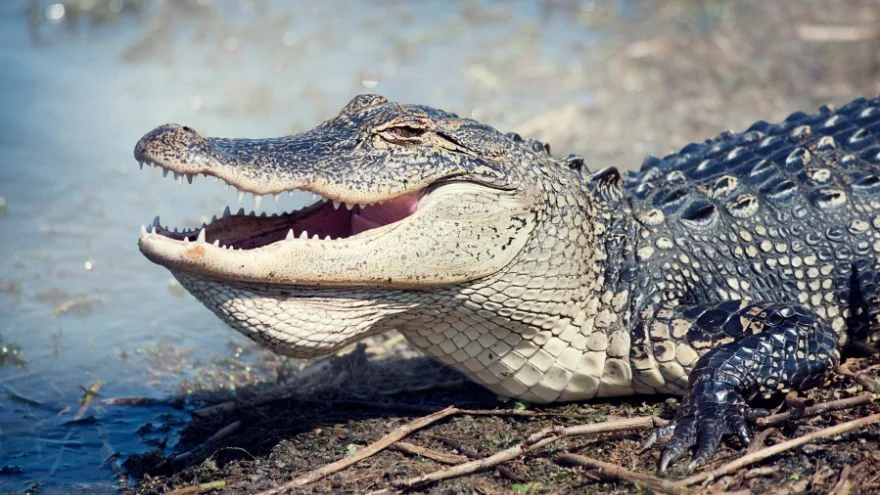Alligators are one of the largest reptiles in the animal kingdom, and just like other reptiles, do alligators shed their skin?
The quick answer is yes. Alligators regularly shed their skin, which keeps going as they age. They shed their skin occasionally, one at a time, making their molting (shedding) process different from other reptiles.
Read on to discover more about alligator shedding and what happens after they shed.
Do Alligators Shed Their Skin?

Yes, alligators occasionally shed their skin. Every type of reptile sheds its skin in some fashion.
Alligator and crocodile skin is scaly. Therefore it frequently sheds in individual scales as they mature. Thus, even while alligators “molt,” it differs greatly from that other reptiles.
A healthy alligator will continue to shed its scales regularly, rubbing up against trees and rocks to rub off the dead skin, just like most creatures, including mammals.
As an alligator gets older and bigger, newer, more prominent, and thicker scales are formed as the old ones shed.
Due to this, their skin is incredibly dense and strong, making it resistant to injuries that scare or rip most animals’ skin. This also disproves the myth that the alligator is bulletproof.
While it isn’t bulletproof, alligator leather is exceptionally durable, making it a popular choice for items and furnishings where a very dense yet, aesthetically pleasing leather is required.
Why Do Alligators Shed?

An alligator’s skin sheds because it’s a part of its biological process. Skin sheds when an animal matures, and new skin is formed to protect it.
Alligators get bigger over the years as they mature. The average length of an alligator is 8.2 feet (2.4 meters) for females and 11.2 feet (3.4 meters) for males.
To make room for the formation of denser, more recent scales, alligators must lose their older scales as they get bigger.
Alligators can better resist harsh conditions and blend in with their surroundings thanks to their new scales.
When Alligators Shed Their Skin, What Happens?
These reptiles do not shed their skin entirely at once, unlike other animals. They have scales that do not fall off all at once.
Alligators routinely shed their scales; at this time, it is common to see them rubbing their scales against rough objects like rocks and trees.
New scales or skin grow back when crocodiles and alligators lose their old ones. They get thicker skin as a result.
Their skin also gets tougher and denser as they age to survive the everyday trauma they endure from things like lush vegetation and fleeing prey, the sun, etc.
What is Alligator Skin Made of?

Osteoderms, also known as scutes, are broad, sturdy, ossified bony plates that cover an alligator’s skin and protect its internal organs and tissues while also assisting in temperature management.[1]
Large, overlapping keratin scales make up this large reptile’s skin. Leather made from alligator skin is both expensive and enduring.
Only the softer, smoother skin from the belly region is typically used.
Alligator leather has a natural enamel finish frequently treated to a high glaze. It is highly sought-after for shoes, purses, and luggage.
Frequently Asked Questions
Do alligators have bulletproof skin?
No animal skin is completely bulletproof, including an alligator’s. These reptiles frequently shed their skin, making room for thicker, stronger skin. This new skin is suited for commercial use because it is thought to be denser and more long-lasting.
Do all reptiles shed their skin?
Although all reptiles shed their skin, they all do so in different ways. Reptiles such as snakes lose their skin all at once, while others, like alligators and crocodiles, shed it in chunks as separate patches or scales.
Reptiles have a variety of skin coverings, including scales, scutes, bony plates, or a combination of all four. All reptiles shed their skin because as they get bigger, older, and gain more size, their skin does not expand.
What else do alligators shed?
Alligators also shed their teeth. When a carnivore’s teeth become worn down, it can replace those teeth.
Alligators’ teeth are crucial because they use them to grab and retain their prey. They can grow up to 3000 teeth in a lifetime and replace them up to 50 times.[2]
Do alligators cry or produce tears?
Alligators are capable of crying. These tears lubricate the nictating membrane and aid in keeping their eyes clean.
Do alligators young shed skin?
Yes, baby alligators do shed their skin. All alligators will eventually lose their skin in some fashion. A gator’s scaly skin will shed in discrete patches or scales as it becomes older and bulkier.
Do alligators get skinned alive?
Alligator skin is quite valuable and can be used to create a variety of leather goods, including belts, bags, and purses, shoes, as well as for functional purposes. Alligators must be skinned to make these goods.
Unfortunately, numerous farms that keep crocodiles and alligators do so inhumanely. The gators are skinned alive on these farms where individuals engage in unethical treatment of animals. Too graphic to tell are the specifics of how this procedure works.
However, not all crocodile and alligator farms are conducted by dishonest individuals. There are still people that adhere to animal rights laws.
Some other leather-producing businesses and farms treat crocodiles and alligators humanely by not skinning them while they are still alive.
To kill the alligator, they would like to employ a bullet of the proper caliber and the most effective way, the captive-bolt gun.
Wrap Up
Lakes, marshes, and swamps are home to alligators. They consume smaller animals because they are carnivorous creatures.
As these reptiles live for about 35 to 70 years and are protected from predators by their skin (scales), which also helps the body retain water for moisture, their skin is one of their distinctive and alluring qualities.
Compared to other reptiles, alligators lose their skin differently. They brush themselves against rocks and trees to do this, though not entirely.
Gators frequently shed because it makes their skin more durable.
![Do Alligators Shed Their Skin [Answered]](https://animalvivid.com/wp-content/uploads/2022/09/Do-Alligators-Shed-Their-Skin-Answered.jpg)

![Do Alligators Have Tongues & Taste Buds [Answered] (1)](https://animalvivid.com/wp-content/uploads/2022/09/Do-Alligators-Have-Tongues-Taste-Buds-Answered-1.jpg.webp)
